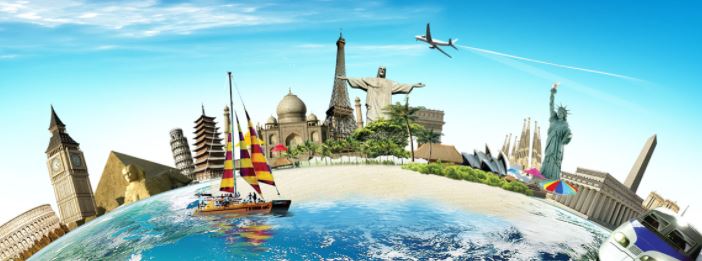Significance of tourism and cultural heritage
 The tourism industry, as part of the service sector, has become an important source of income for many regions and even for entire countries. The Manila Declaration on World Tourism of 1980 recognized its importance as "an activity essential to the life of nations because of its direct effects on the social, cultural, educational, and economic sectors of national societies, and on their international relations.
The tourism industry, as part of the service sector, has become an important source of income for many regions and even for entire countries. The Manila Declaration on World Tourism of 1980 recognized its importance as "an activity essential to the life of nations because of its direct effects on the social, cultural, educational, and economic sectors of national societies, and on their international relations.
Tourism and Income
Tourism brings large amounts of income into a local economy in the form of payment for goods and services needed by tourists, accounting as of 2011 for 30% of the world's trade in services, and, as an invisible export, for 6% of overall exports of goods and services. It also generates opportunities for employment in the service sector of the economy associated with tourism.
The Hospitality Industries and Tourism
The hospitality industries which benefit from tourism include transportation services (such as airlines, cruise ships, trains and taxicabs); lodging (including hotels, hostels, homestays, resorts and renting out rooms); and entertainment venues (such as amusement parks, restaurants, casinos, shopping malls, music venues, and theatres). This is in addition to goods bought by tourists, including souvenirs.
On the flip-side, tourism can degrade people and sour relationships between host and guest
Tourism and the Economic Foundations
The economic foundations of tourism are essentially the cultural assets, the cultural property and the nature of the travel location. The World Heritage Sites are particularly worth mentioning today because they are real tourism magnets. But even a country's current or former form of government can be decisive for tourism. For example, the fascination of the British royal family brings millions of tourists to Great Britain every year and thus the economy around £550 million a year. The Habsburg family can be mentioned in Central Europe. According to estimates, the Habsburg brand should generate tourism sales of 60 million euros per year for Vienna alone. The tourist principle "Habsburg sells" applies.
Tourism, cultural heritage and UNESCO
Cultural and natural heritage are in many cases the absolute basis for worldwide tourism. Cultural tourism is one of the megatrends that is reflected in massive numbers of overnight stays and sales. As UNESCO is increasingly observing, the cultural heritage is needed for tourism, but also endangered by it. The "ICOMOS - International Cultural Tourism Charter" from 1999 is already dealing with all of these problems. As a result of the tourist hazard, for example, the Lascaux cave was rebuilt for tourists. Overtourism is an important buzzword in this area. Furthermore, the focus of UNESCO in war zones is to ensure the protection of cultural heritage in order to maintain this future important economic basis for the local population. And there is intensive cooperation between UNESCO, the United Nations, the United Nations peacekeeping and Blue Shield International. There are extensive international and national considerations, studies and programs to protect cultural assets from the effects of tourism and those from war. In particular, it is also about training civilian and military personnel. But the involvement of the locals is particularly important. The founding president of Blue Shield International Karl von Habsburg summed it up with the words: “Without the local community and without the local participants, that would be completely impossible”.
Definitions Tourism
 In 1936, the League of Nations defined a foreign tourist as "someone traveling abroad for at least twenty-four hours". Its successor, the United Nations, amended this definition in 1945, by including a maximum stay of six months
In 1936, the League of Nations defined a foreign tourist as "someone traveling abroad for at least twenty-four hours". Its successor, the United Nations, amended this definition in 1945, by including a maximum stay of six months
In 1941, Hunziker and Kraft defined tourism as "the sum of the phenomena and relationships arising from the travel and stay of non-residents, insofar as they do not lead to permanent residence and are not connected with any earning activity." In 1976, the Tourism Society of England's definition was: "Tourism is the temporary, short-term movement of people to destinations outside the places where they normally live and work and their activities during the stay at each destination. It includes movements for all purposes." In 1981, the International Association of Scientific Experts in Tourism defined tourism in terms of particular activities chosen and undertaken outside the home.
- Domestic tourism, involving residents of the given country traveling only within this country
- Inbound tourism, involving non-residents traveling in the given country
- Outbound tourism, involving residents traveling in another country
In 1994, the United Nations identified three forms of tourism in its Recommendations on Tourism Statistics:
- National Tourism: It is a combination of domestic and outbound tourism
- Regional Tourism: It is a combination of domestic and inbound tourism
- International Tourism: It is a combination of inbound and outbound tourism
Other groupings derived from the above grouping:
The terms tourism and travel are sometimes used interchangeably. In this context, travel has a similar definition to tourism but implies a more purposeful journey. The terms tourism and tourist are sometimes used pejoratively, to imply a shallow interest in the cultures or locations visited. By contrast, traveler is often used as a sign of distinction. The sociology of tourism has studied the cultural values underpinning these distinctions and their implications for class relationsç